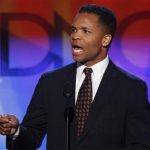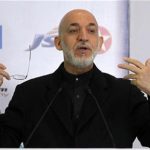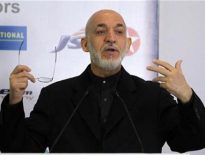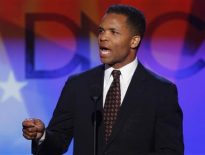(Reuters) – He is one of the most wanted war crimes fugitives in the world and the International Criminal Court lists him as “at large”.
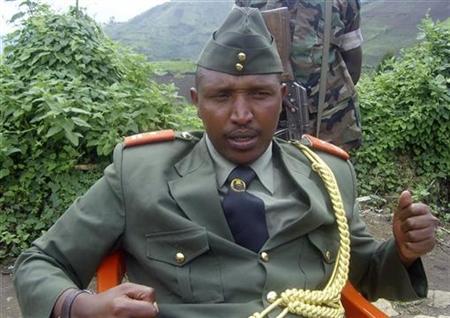
Bosco “The Terminator” Ntaganda, the Rwandan-born Tutsi warlord U.N. experts say controls the M23 rebellion in eastern Democratic Republic of Congo, has stayed largely invisible as M23 fighters notch up military success after success.
Ntaganda, wanted by the ICC for war crimes and crimes against humanity – including recruiting child soldiers, murder, rape and sexual slavery – was not sighted among the M23 commanders who paraded victoriously through the eastern Congolese city of Goma on Tuesday after it fell to the rebels.
M23, which started in April as a mutiny of Congolese army troops complaining about the government failing to fulfil the terms of a peace deal from an earlier conflict, now says it plans to “liberate” all of Congo.
Regional and international leaders are scrambling to halt a fresh conflagration in a Great Lakes borderlands region that has long been a tinderbox of ethnic and political conflict fuelled by mineral riches. Several million people have died from war, hunger and disease in the Congo in the last two decades.
The career of Ntaganda, who has fought for rebels, militias and armies in both Rwanda and Congo in the last 20 years, reflects the tangled and shifting allegiances of a territory that has been repeatedly traumatized by genocide and violence.
He was a member of the Rwandan Patriotic Front (RPF) rebel group of now Rwandan President Paul Kagame, fought in east Congo’s previous Tutsi-led CNDP rebellion headed by Laurent Nkunda and then became an officer in the integrated Congolese army of President Joseph Kabila, whom he now seeks to topple.
A report by a U.N. panel of experts in October names Ntaganda as the leader who controls the M23 rebellion on the ground and adds that he and other rebel commanders “receive direct military orders” from senior Rwandan military figures acting under instructions from Defence Minister James Kabarebe.
Rwanda vehemently denies supporting the M23, accusing the world of trying to blame it for Congo’s unremitting troubles.
Ntaganda has hardly been seen since April, when he deserted the army, triggering a wave of defections by other former Tutsi rebels from the Congolese army. In May he dismissed reports of his role in the nascent rebellion as “lies”, telling the BBC in an interview he was still at his farm in Masisi in east Congo’s North Kivu province.
“What soldiers? I have no soldiers,” he said.
More visible M23 commanders, like Colonel Sultani Makenga, have also maintained this line, saying Ntaganda is not involved.
But groups which closely follow the Congo say his invisibility has not diminished his influence.
“We have been getting reports, including from insiders, that even though he is less visible, he has still been playing a leading role,” Carina Tertsakian, a researcher on the Great Lakes for Human Rights Watch, told Reuters.
Congolese intelligence sources say Ntaganda is believed to be at the M23 stronghold of Runyoni near the Rwandan border and next to the heavily forested Virunga national park.
PEACEMAKER TURNED WARMONGER AGAIN?
M23’s name refers to the March 23 date of the 2009 accord that ended Nkunda’s revolt: the new rebels accuse Kabila’s government of not complying with the terms of that agreement to fully integrate Congolese Tutsis into the army and government.
Relatively rare photographs of Ntaganda show a youthful, smooth-cheeked figure, often smiling broadly, who likes wearing military berets or leather cowboy hats with his camouflage fatigues. He is believed to be around 40.
Ntaganda replaced Nkunda as head of the Tutsi-led CNDP rebel group when Nkunda was arrested in early 2009. As the new CNDP boss, he negotiated the March 23, 2009 deal that saw the group incorporated into the Congolese army, where he became a general.
Those who have spoken to him say he can project an engaging personality, but lacks the charisma and rhetorical skills of Nkunda, the previous CNDP leader.
“My troops love me,” he told a Reuters interviewer in an October 5, 2010 interview in Goma when he was a general in the integrated Congolese army involved in United Nations-backed operations against Rwandan-led Hutu rebels in the Congo.
“Who gave peace to Congo? It was me, General Bosco,” he said, arguing that he played a leading role in ending the revolt and reconciling the CNDP with Kabila’s government.
His senior position in Congo’s armed forces and swaggering presence in Goma outraged rights groups like Human Rights Watch which repeatedly demanded his arrest by the Congolese authorities and by U.N. peacekeepers.
“Ntaganda has boldly walked around the restaurants and tennis courts of Goma flaunting his impunity like a medal of honor while engaging in ruthless human rights abuses,” Anneke Van Woudenberg, a longtime Congo watcher and previously a senior Africa researcher with HRW, said in April.
Kabila’s government says it did not arrest Ntaganda sooner because he had contributed to forging the 2009 peace.
“I have to tell you that we had good reason not to arrest Bosco Ntaganda. The main reason was to consolidate the peace process, to which he had contributed,” Congolese government chief spokesman Lambert Mende said in May this year.
In a report in October, the Brussels-based International Crisis Group noted the irony of “an ICC-indicted former warlord” being involved in U.N.-backed military operations.
The ICG says it was precisely the “U-turn” of Kabila’s government earlier this year, under pressure from foreign backers like the United States, to publicly seek Ntaganda’s arrest that drove him to lead Tutsi fighters into mutiny.
TRAFFICKING IN MINERALS
The main ICC charges against Ntaganda relate to his activities as chief of operations for the Congolese militia group Union of Congolese Patriots (UPC)/Patriotic Forces for the Liberation of Congo (FPLC) in 2002-2003 in the northeast Ituri district. He has rejected the charges against him as “lies”.
In March, 2012, the ICC found Ntaganda’s co-accused, Thomas Lubanga, guilty of the war crime of recruiting and using child soldiers in the court’s first case. Following the verdict, the ICC prosecutor announced additional charges of rape and murder against Ntaganda in connection with his activities in Ituri.
“Congo is full of war criminals, but the ICC arrest warrants put Ntaganda in a different league,” HRW’s Tertsakian said.
International Crisis Group says Ntaganda has also been involved in trafficking of raw materials, such as gold. Between 2009 and 2012, he acquired properties in Goma and Masisi, including a hotel, a mill and a gas station, and conducted business in the supply of fuel from Kenya, ICG said.
It is not clear whether M23, despite what the U.N. experts say is its significant backing from Rwanda, has the military clout to march on Kinshasa and threaten Kabila’s rule there.
Observers like HRW’s Tertsakian said M23 is not as strong as Nkunda’s CNDP was and that Ntaganda is a less effective leader.
But, as urgent talks are held in Uganda to try to contain the rebellion, it is hard to imagine a new deal between Kabila and the Tutsi fighters who have repeatedly rebelled against him, like Ntaganda or the more public M23 leader, Makenga.
“I still have a hard time envisioning a compromise between the two sides. Just try to imagine Sultani Makenga and Bosco Ntaganda integrated back into the army as generals and you will know what I mean,” said independent Congo analyst and author Jason Stearns.
(Additional reporting by Jonny Hogg; Writing by Pascal Fletcher; Editing by Peter Graff)


